Customer feedback is everywhere—on social media, in surveys, within support tickets, and across review sites. Leading companies know how to harness their customer feedback to power better business decisions at all levels of the organization.
One of the key ways to do this is by unearthing and analyzing customer sentiment data. Most sentiment analysis tools typically categorize sentiments into broad groups like 'positive,' 'neutral,' and 'negative.'
But getting a great sentiment analysis tool in place can be a secret weapon among teams that do this well, as it can make the difference between staying at surface-level insights or diving deep into the psychology behind ratings and scores.
Whether you’re on the hunt for a new sentiment analysis tool or are looking to set one up from scratch, it helps to have some decision criteria for how to move forward. In this article, we’ll dive into the best sentiment analysis tools in 2025, curated to help fit a range of business needs.

What Is a Sentiment Analysis Tool?
A sentiment analysis tool is designed to automatically interpret and classify the emotional tone behind words, phrases, or entire passages of text. Using an advanced sentiment analysis model, these tools can classify emotions such as positive, negative, or neutral.
For a customer insights team, it’s a compass helping to navigate through mountains of customer feedback, pinpointing whether the overall sentiment is positive, negative, or neutral.
These tools can identify and respond to negative sentiment to help brands manage potential crises by prioritizing mentions that reflect adverse reactions and providing insights that discern varying degrees of emotions, including negative sentiment.

If you’re a VoC (Voice of the Customer) research lead, you likely have a goal to boost a customer-focused KPI like NPS or CSAT. If you’re sitting on a ton of unstructured data from different sources, it can be hard to make sense of the data beyond the surface level.
This is where sentiment analysis tools shine—they take all your unstructured data, identify patterns, and highlight the overall mood of your customer base. So instead of guessing, you get a clear, actionable understanding of where your customer experience strategy stands now, and where it needs to go.
What is Sentiment Analysis?
Definition and Explanation
Sentiment analysis, also known as opinion mining or emotion AI, is a technique used to determine the emotional tone or attitude conveyed by a piece of text. This could be anything from a social media post to a customer review or survey response. Sentiment analysis software employs various approaches to analyze text and determine its sentiment, including rule-based methods, machine learning (ML), and hybrid techniques.
By analyzing sentiment, businesses can gain valuable insights into customer opinions, preferences, and emotions. These insights are crucial for informing product development, marketing strategies, and customer service improvements. In essence, sentiment analysis helps businesses understand how their customers feel, enabling them to make more informed decisions and enhance overall customer satisfaction.
19 Best Sentiment Analysis Tools
Having the right tool can make all the difference between meaningful sentiment data, and surface-level insights. Below we've curated a comprehensive list of the best sentiment analysis tools. We’ve highlighted key details for each, so whether you’re looking for a robust all-in-one platform, or a specialized solution, this guide has you covered.

1. Kapiche
Kapiche is an AI-powered sentiment analysis tool designed for customer insights teams who need detailed, accurate insights quickly. It uses advanced NLP and auto-theming capabilities to transform unstructured customer data into clear, actionable feedback.
Best For: Organizations that want a comprehensive, automated solution for analyzing qualitative and quantitative feedback simultaneously.
Notable Features:
AI-powered auto-theming for thematic analysis
Integrates data from surveys, social media, and support channels
Real-time sentiment tracking with customizable dashboards
Pros: Kapiche excels at providing actionable insights by leveraging AI to automate and optimize the sentiment analysis process. The platform’s ability to handle both structured and unstructured data means teams get a holistic view of customer sentiment, helping them make informed decisions faster.
Cons: While Kapiche’s advanced capabilities make it an ideal tool for large-scale feedback analysis, its comprehensive nature may come with a learning curve for smaller teams or those who are new to AI-powered sentiment tools.
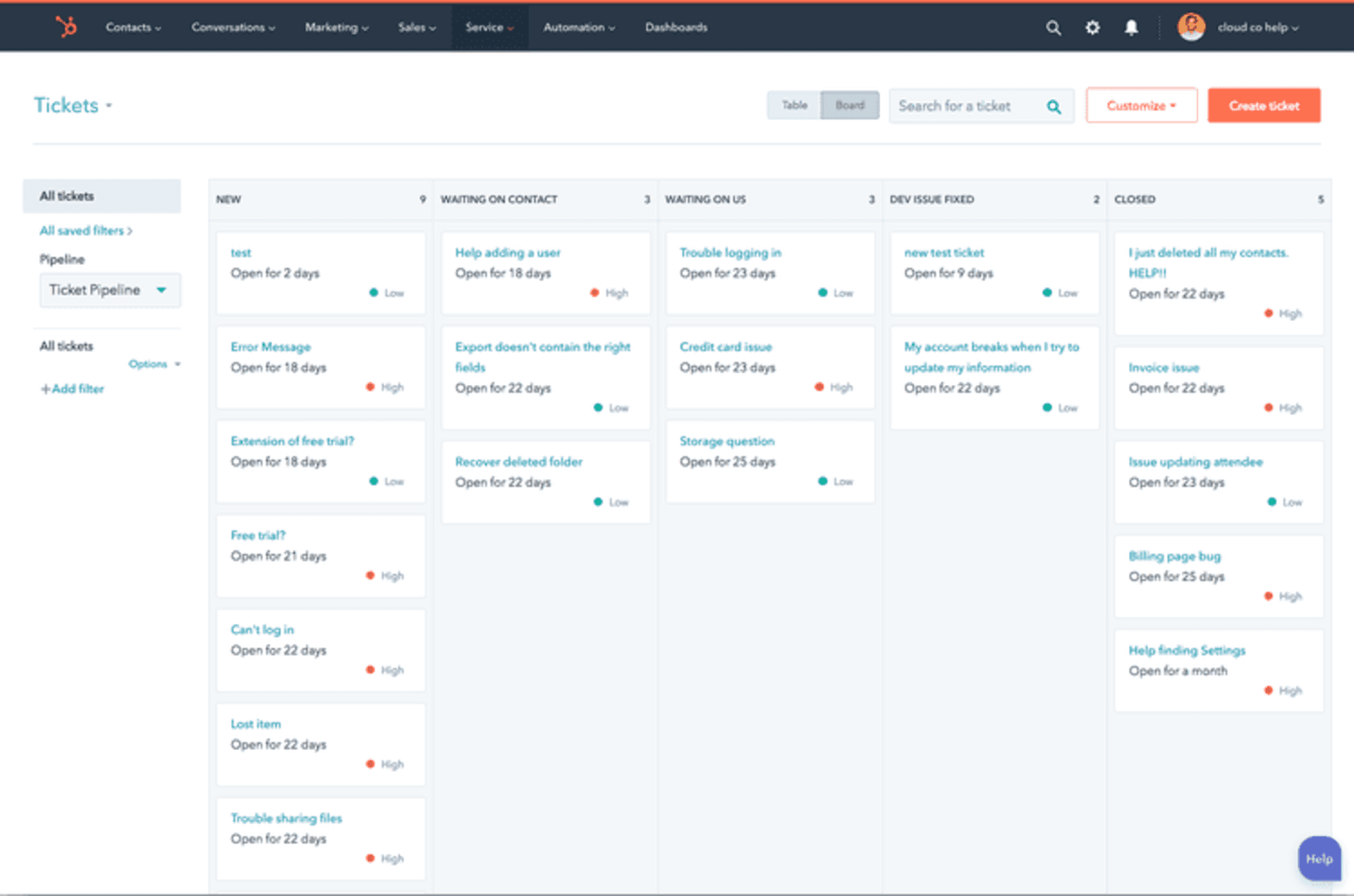
2. HubSpot Service Hub
HubSpot Service Hub is a versatile tool designed to help teams analyze customer sentiment and feedback in real-time. With a focus on integrating sentiment analysis within its broader customer service suite, it’s perfect for teams looking to align their sentiment analysis efforts with overall customer service improvements.
Best For: Companies seeking a unified platform that combines customer service and sentiment analysis to enhance their customer experience initiatives.
Notable Features:
Real-time feedback monitoring
Comprehensive customer support suite integration
Automatic sentiment classification
Customizable dashboards
Pros: HubSpot Service Hub provides a seamless experience for businesses already using the HubSpot ecosystem. Its sentiment analysis capabilities integrate smoothly with other customer service tools, making it easy to track sentiment trends alongside customer interactions, leading to more responsive service strategies.
Cons: While it’s convenient for existing HubSpot users, companies not currently using HubSpot’s ecosystem may find the setup less intuitive, as it requires integration across multiple HubSpot products.
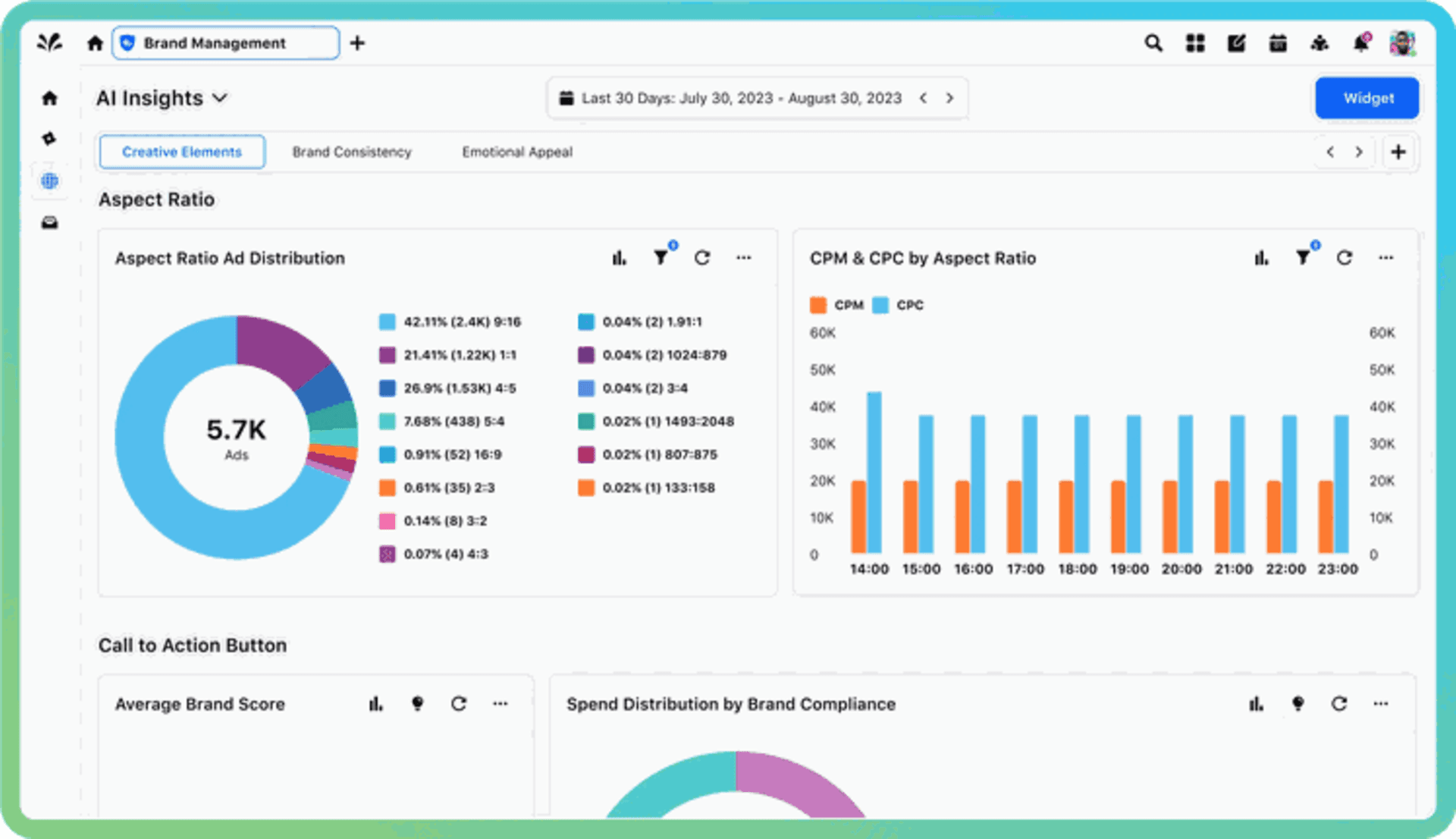
3. Sprinklr
Sprinklr is a customer experience management platform with robust sentiment analysis capabilities. It’s particularly useful for organizations that want to monitor customer sentiment across a wide range of social media and digital channels.
Best For: Large enterprises needing to manage and analyze sentiment across multiple social media platforms and digital touchpoints.
Notable Features:
Real-time social media monitoring
Multilingual sentiment analysis
Integration with CRM systems
AI-driven insights and reporting
Pros: Sprinklr’s strength lies in its ability to provide sentiment analysis on a global scale, supporting multiple languages and channels. This is especially beneficial for companies with a strong social media presence or those with diverse audiences, as it allows them to track sentiment trends in real time.
Cons: The platform’s extensive features and scalability are ideal for large enterprises, but small to mid-sized companies may find its functionalities overwhelming and potentially excessive for their needs.
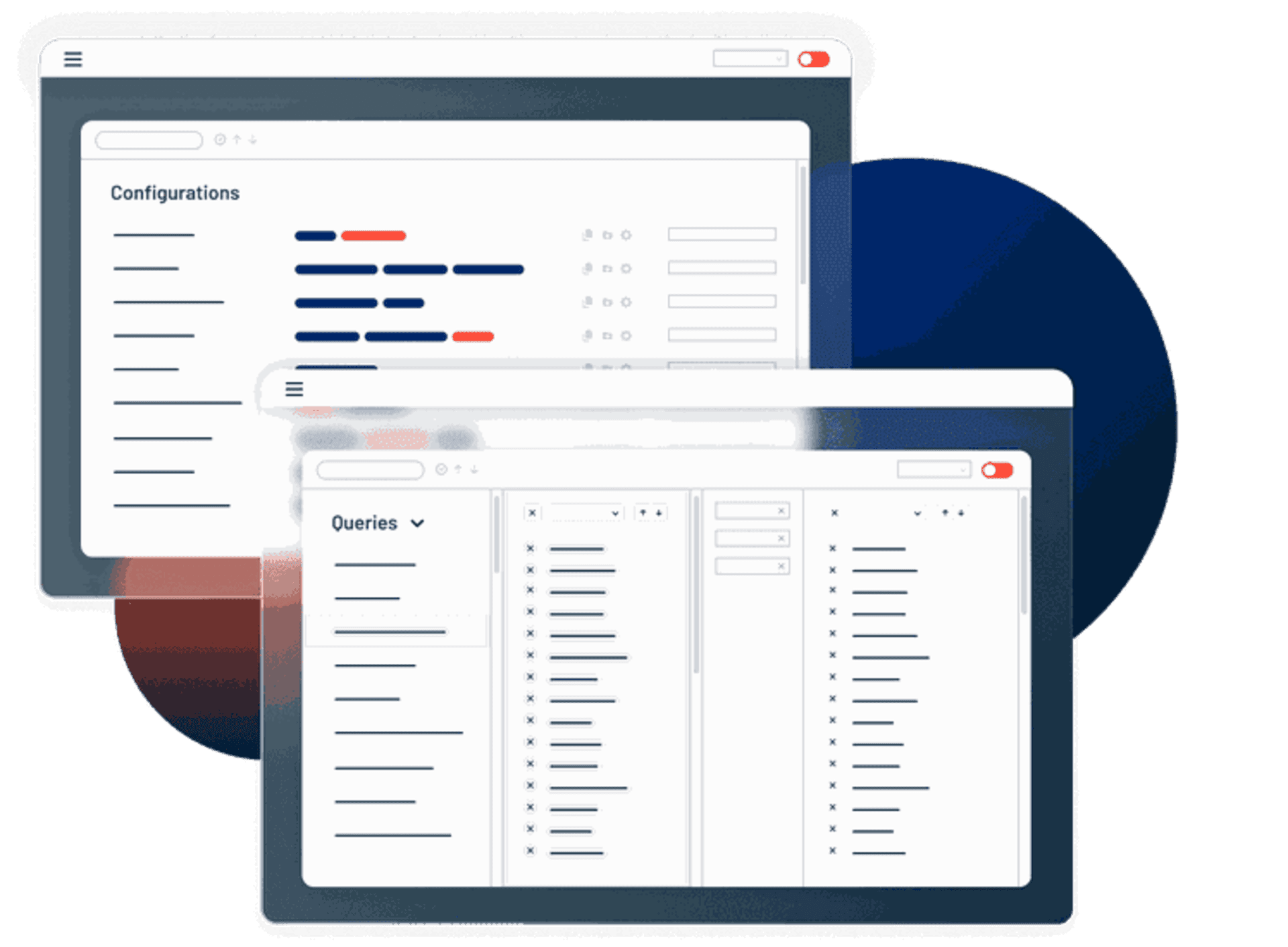
4. Lexalytics
Lexalytics offers an advanced AI-powered sentiment analysis platform that processes large volumes of text data. With its focus on natural language processing (NLP), it’s great for teams looking to gain insights from unstructured customer data like reviews, surveys, and social media posts.
Best For: Organizations looking for a powerful NLP-driven platform that specializes in analyzing unstructured textual data for deeper customer insights.
Notable Features:
Advanced NLP technology
Aspect-based sentiment analysis
Customizable sentiment models
Integration with enterprise software
Pros: Lexalytics excels at offering precise and tailored sentiment analysis through its NLP capabilities. The platform’s flexibility allows users to create customized sentiment models, making it suitable for enterprises with unique customer feedback requirements.
Cons: Due to its advanced technology, Lexalytics might require technical expertise for optimal setup and use. Smaller companies or teams without dedicated technical resources may find it challenging to fully leverage its capabilities.
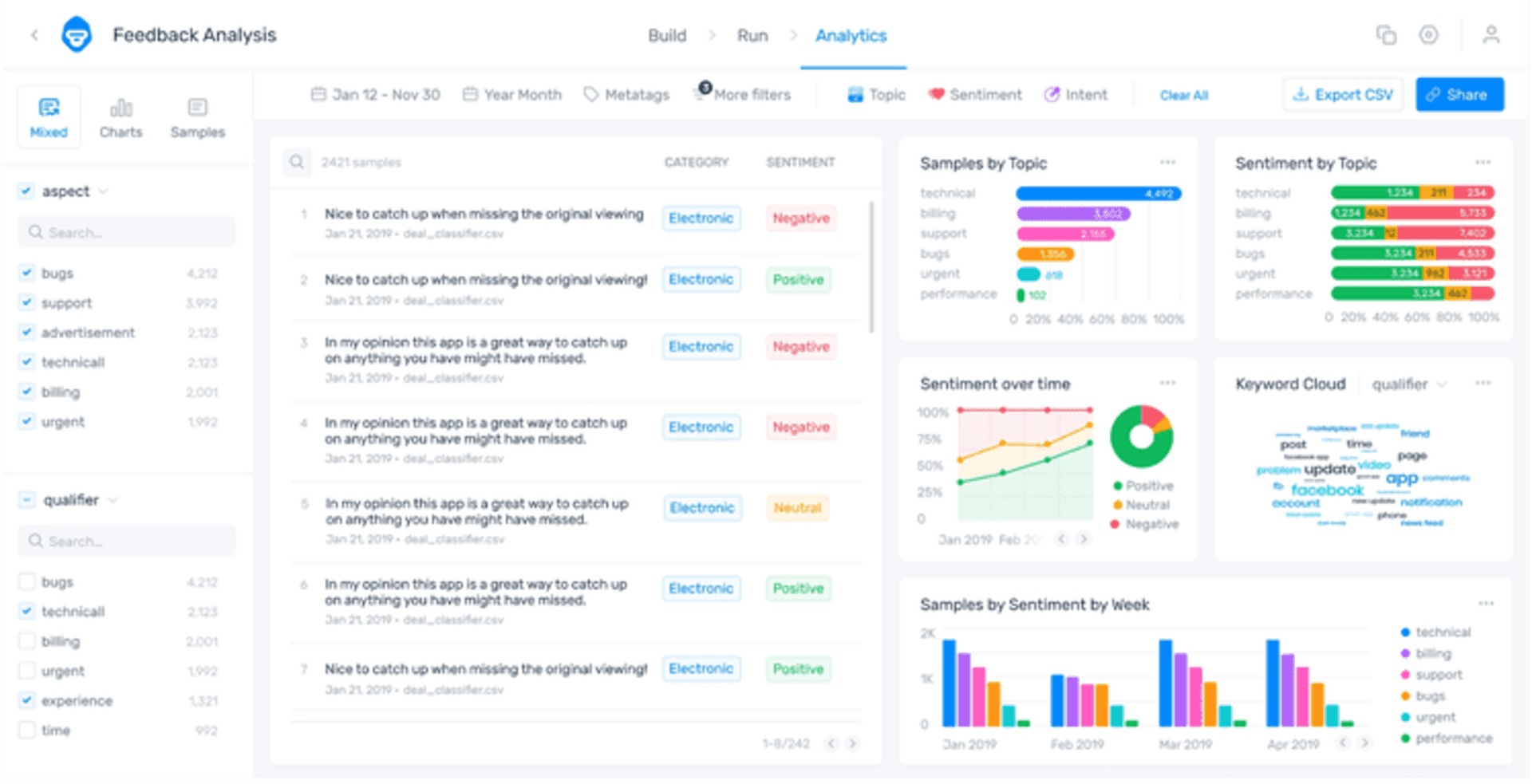
5. MonkeyLearn
MonkeyLearn is an easy-to-use sentiment analysis tool designed for small to medium-sized businesses. Its customizable features and user-friendly interface make it an accessible option for teams new to sentiment analysis who want to start small and scale as needed.
Best For: Small and mid-sized companies looking for an intuitive, scalable sentiment analysis tool that’s easy to implement.
Notable Features:
Drag-and-drop model creation
Pre-trained sentiment analysis models
API integration for real-time analysis
Data visualization tools
Pros: MonkeyLearn’s simple setup and intuitive interface make it a great entry point for smaller businesses. The ability to create customized models using drag-and-drop functionality means teams can easily tailor the tool to their specific needs without extensive technical expertise.
Cons: Although suitable for smaller projects, MonkeyLearn may lack some of the advanced capabilities that larger enterprises require, especially when it comes to handling high volumes of diverse data sources.
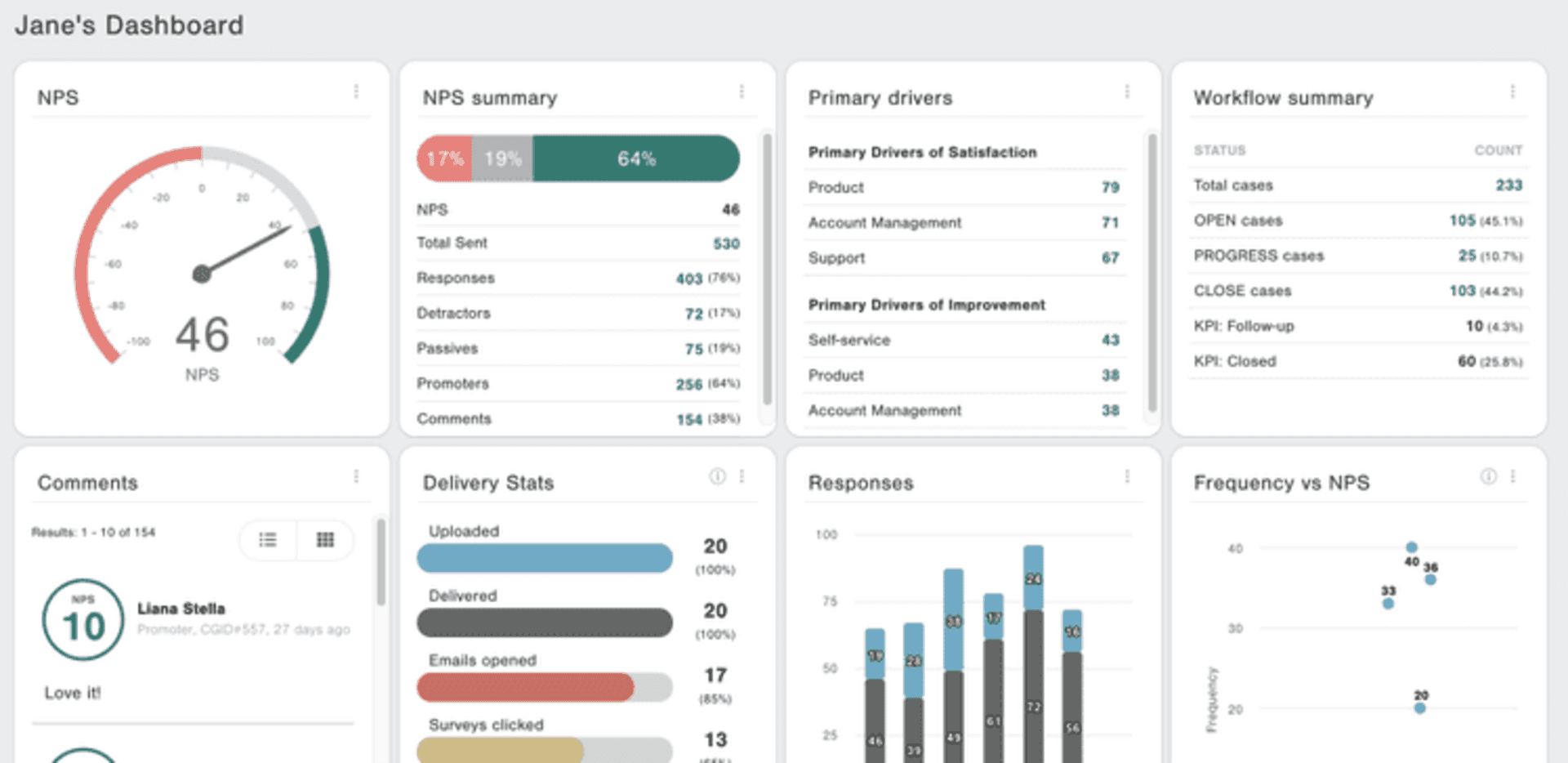
6. CustomerGauge
CustomerGauge specializes in helping businesses improve their Net Promoter Score (NPS) through sentiment analysis and feedback management. It offers a comprehensive approach to understanding customer sentiment and its impact on overall loyalty metrics.
Best For: Companies focusing on improving NPS scores and customer loyalty through targeted sentiment analysis and feedback initiatives.
Notable Features:
NPS-focused sentiment tracking
Feedback and survey management
Integration with CRM platforms
Real-time alerts for negative feedback
Pros: CustomerGauge’s platform is particularly effective for organizations that prioritize NPS as a key performance metric. Its integration with CRM systems ensures that feedback and sentiment data are directly linked to customer profiles, enabling personalized and proactive customer management strategies.
Cons: The tool’s focus on NPS can be limiting for companies seeking a broader range of sentiment analysis applications beyond loyalty metrics, such as social media sentiment tracking or thematic analysis.
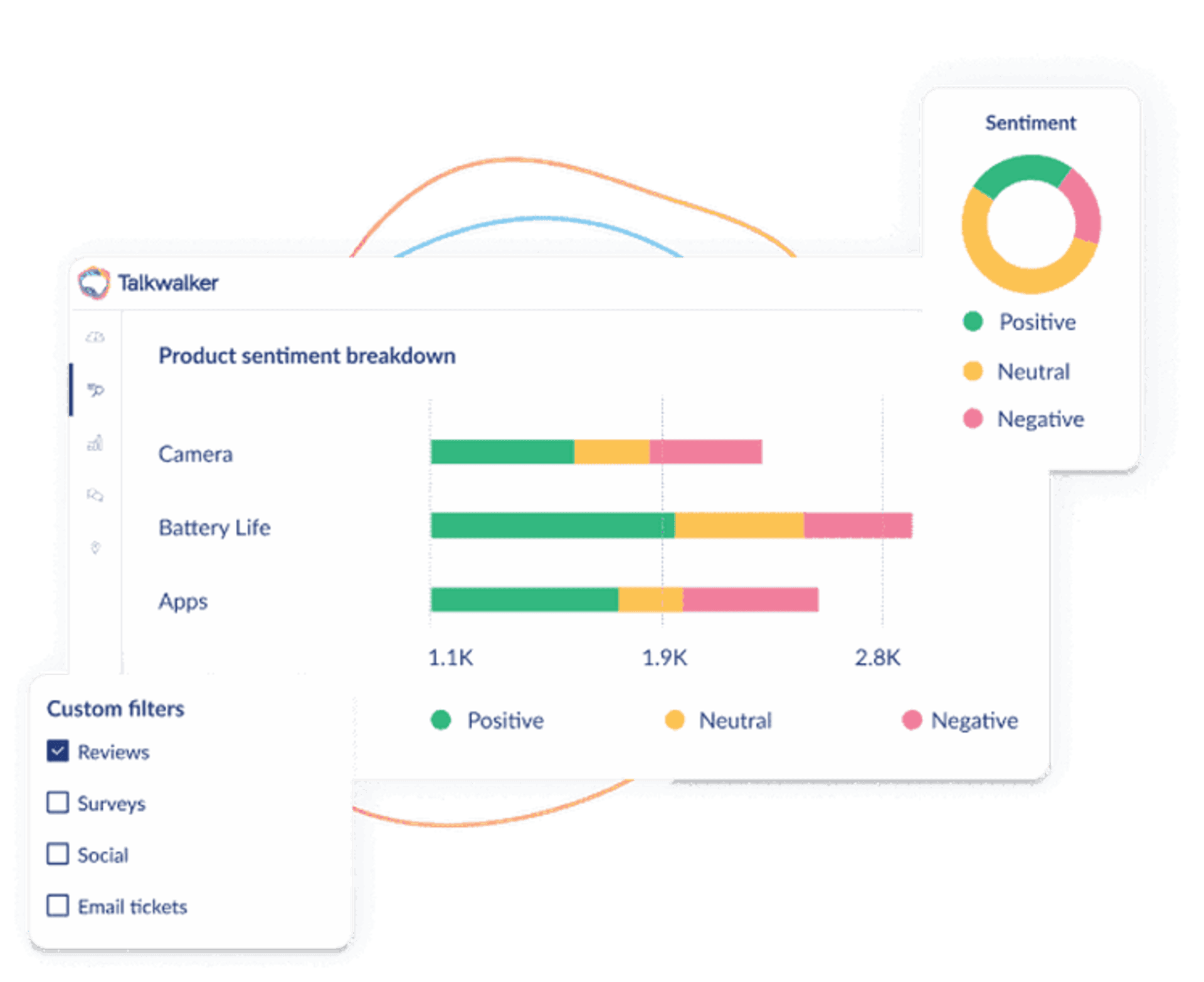
7. Talkwalker
Talkwalker is a social media monitoring and sentiment analysis tool built for brands looking to understand public sentiment across social platforms and online media. It excels at tracking brand perception and monitoring real-time conversations.
Best For: Brands and marketing teams who need a robust tool for monitoring social media sentiment and brand reputation.
Notable Features:
Real-time social listening
Image and video analysis
Multilingual sentiment detection
Crisis management alerts
Pros: Talkwalker is particularly effective for brands with a strong social media presence, providing real-time sentiment updates and crisis alerts. Its ability to analyze not just text but also images and videos makes it a powerful tool for monitoring brand reputation comprehensively.
Cons: While the platform is highly effective for social media sentiment, companies looking for in-depth analysis of survey or CRM data may find it limited. Its focus on social listening could make it less suitable for broader customer experience applications.
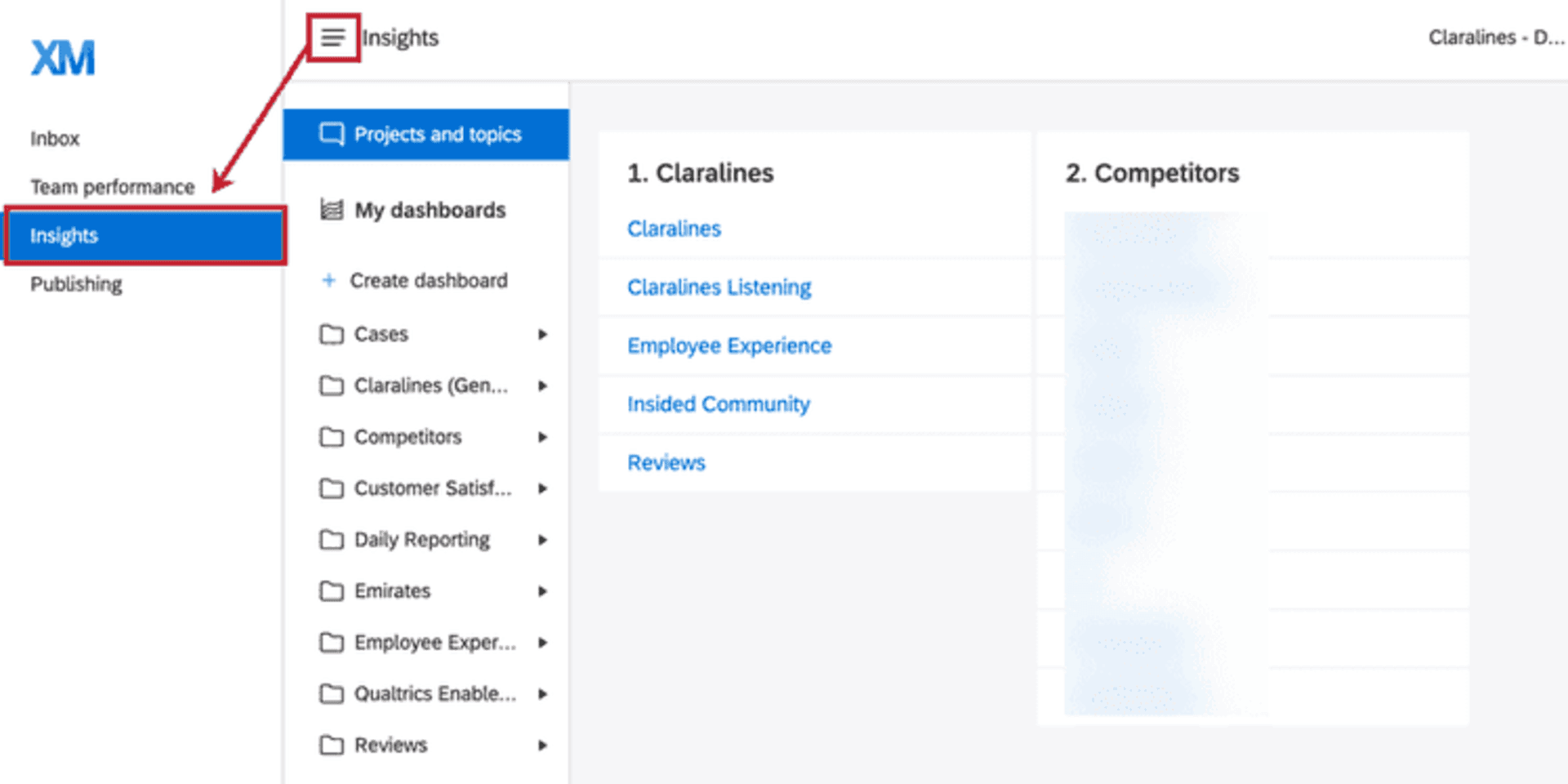
8. Qualtrics XM
Qualtrics XM is a versatile platform designed for businesses seeking to manage and analyze customer experience data. Its sentiment analysis features are integrated into a broader suite of tools, making it suitable for organizations looking for an all-in-one experience management solution.
Best For: Companies wanting to integrate sentiment analysis with a comprehensive experience management suite.
Notable Features:
Unified feedback management
Multichannel sentiment analysis
Integration with CRM systems
AI-powered sentiment tracking
Pros: Qualtrics XM is ideal for businesses that need a cohesive platform to manage and analyze customer feedback data across various channels. The platform’s AI-powered sentiment tracking allows teams to understand customer sentiment in real-time, providing insights that can influence immediate actions and long-term strategies.
Cons: While the integration with other experience management tools is beneficial for existing Qualtrics users, those who require a standalone sentiment analysis solution or who aren’t using the broader Qualtrics suite may find it unnecessarily complex.
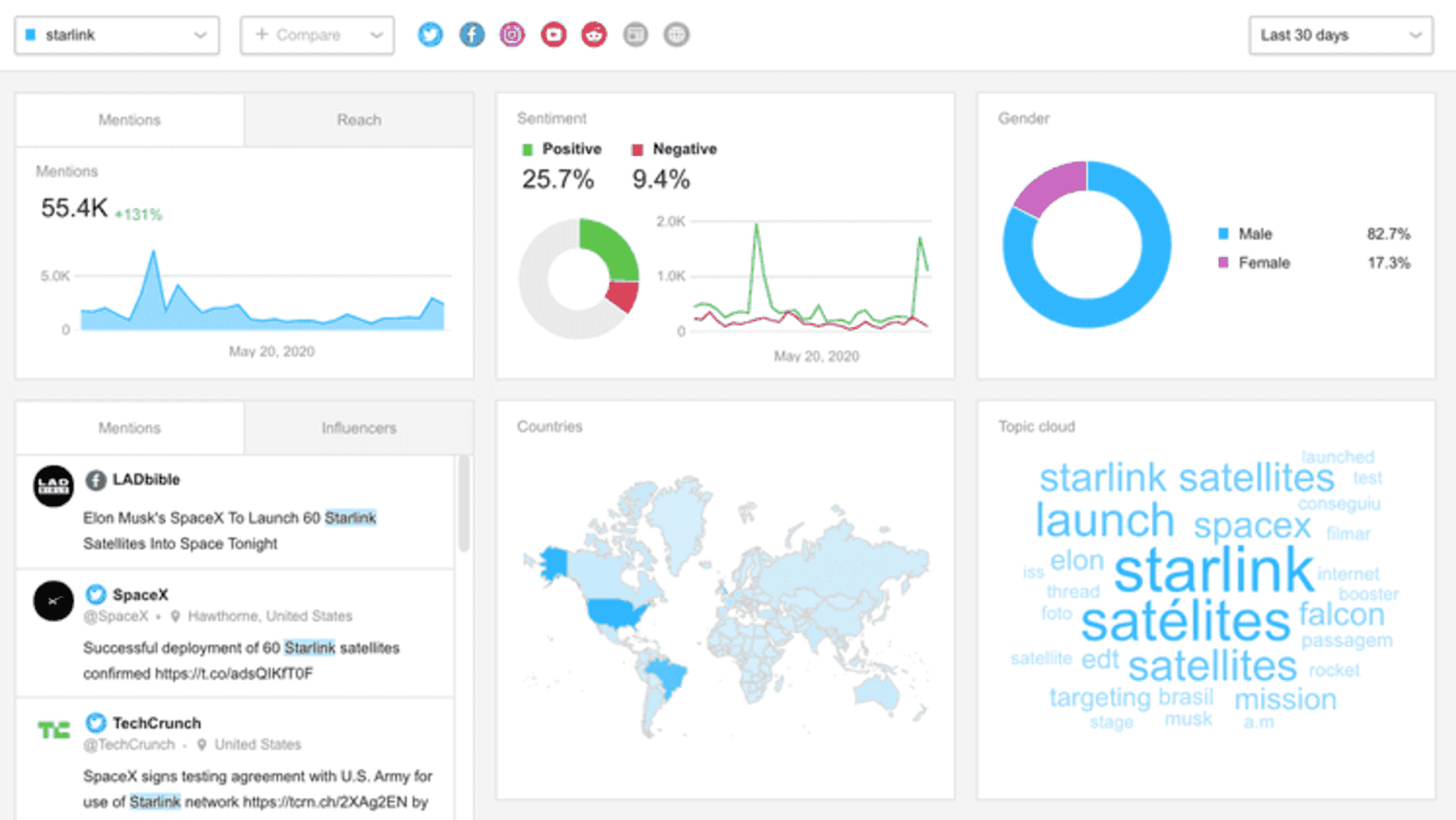
9. Awario
Awario is a social media monitoring tool that offers sentiment analysis capabilities for tracking brand mentions and customer sentiment across social networks. It’s ideal for businesses aiming to gain real-time insights into customer feedback, particularly in social media contexts.
Best For: Companies that prioritize monitoring brand sentiment on social media and want a real-time, social-first sentiment analysis tool.
Notable Features:
Real-time social media monitoring
Multilingual sentiment tracking
Integration with CRM and marketing tools
Custom alerts for brand mentions
Pros: Awario provides effective sentiment tracking for brands looking to understand how customers perceive them on social media. Its real-time monitoring and custom alerts allow businesses to respond quickly to negative mentions or capitalize on positive ones, improving brand management strategies.
Cons: While Awario is highly effective for social media sentiment analysis, it may not offer the same depth or range of sentiment insights across other feedback channels, such as customer surveys or support center interactions.
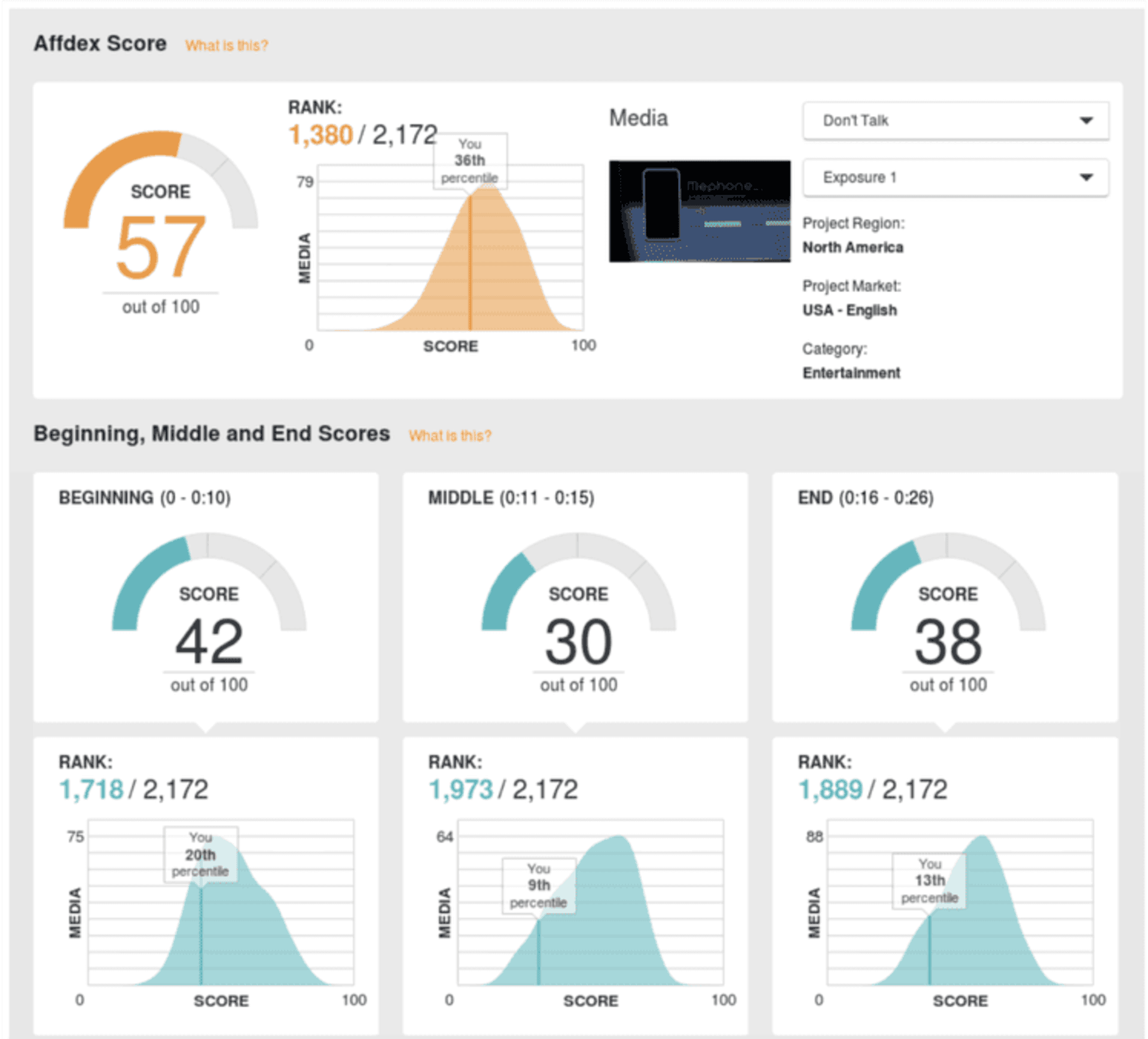
10. Affectiva
Affectiva specializes in emotion AI, offering tools that analyze video and audio data to gauge emotional responses, including sentiment analysis. This is especially useful for brands looking to understand consumer reactions in real-time.
Best For: Companies wanting to analyze emotional responses from video or audio data alongside traditional text-based sentiment analysis.
Notable Features:
Real-time emotion tracking
Video and audio analysis capabilities
Integration with marketing and feedback systems
Advanced reporting features
Pros: Affectiva’s unique focus on emotional responses provides brands with insights that go beyond traditional sentiment analysis. By analyzing video and audio data, businesses can capture nuanced consumer reactions, enhancing their understanding of customer experiences.
Cons: The specialized nature of Affectiva’s tools may make it less relevant for organizations that primarily focus on text-based sentiment analysis, as it might not provide a comprehensive solution for all feedback types.
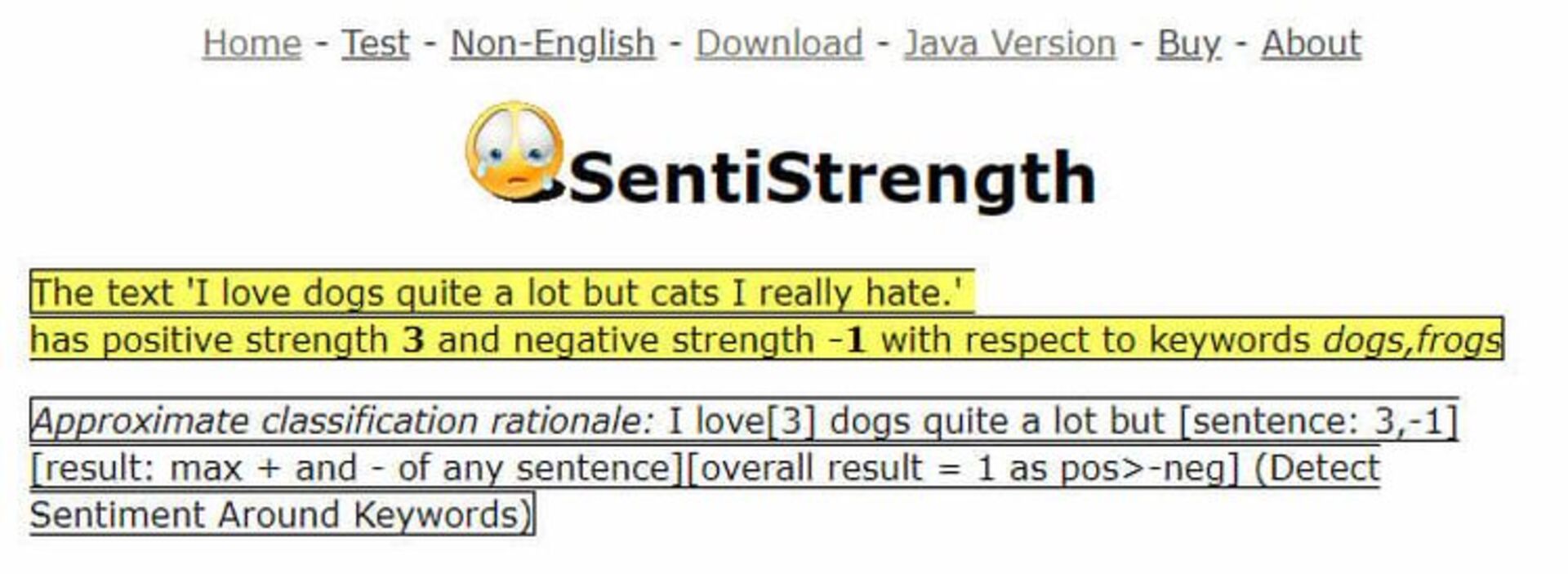
11. SentiStrength
SentiStrength is a straightforward sentiment analysis tool that measures the strength of sentiment in social media and text data. It’s designed to be simple and effective, making it an excellent option for smaller businesses or individual users.
Best For: Smaller organizations or individuals seeking a cost-effective, easy-to-use sentiment analysis solution for social media and text data.
Notable Features:
Simple interface for sentiment scoring
Real-time sentiment analysis
Support for multiple languages
Free access to basic features
Pros: SentiStrength offers an accessible entry point into sentiment analysis, making it suitable for smaller teams or those with limited budgets. Its straightforward scoring system allows users to quickly understand sentiment trends without needing advanced training.
Cons: The tool's simplicity may limit its effectiveness for larger organizations needing more comprehensive features or integrations with other data sources for a complete sentiment analysis strategy.
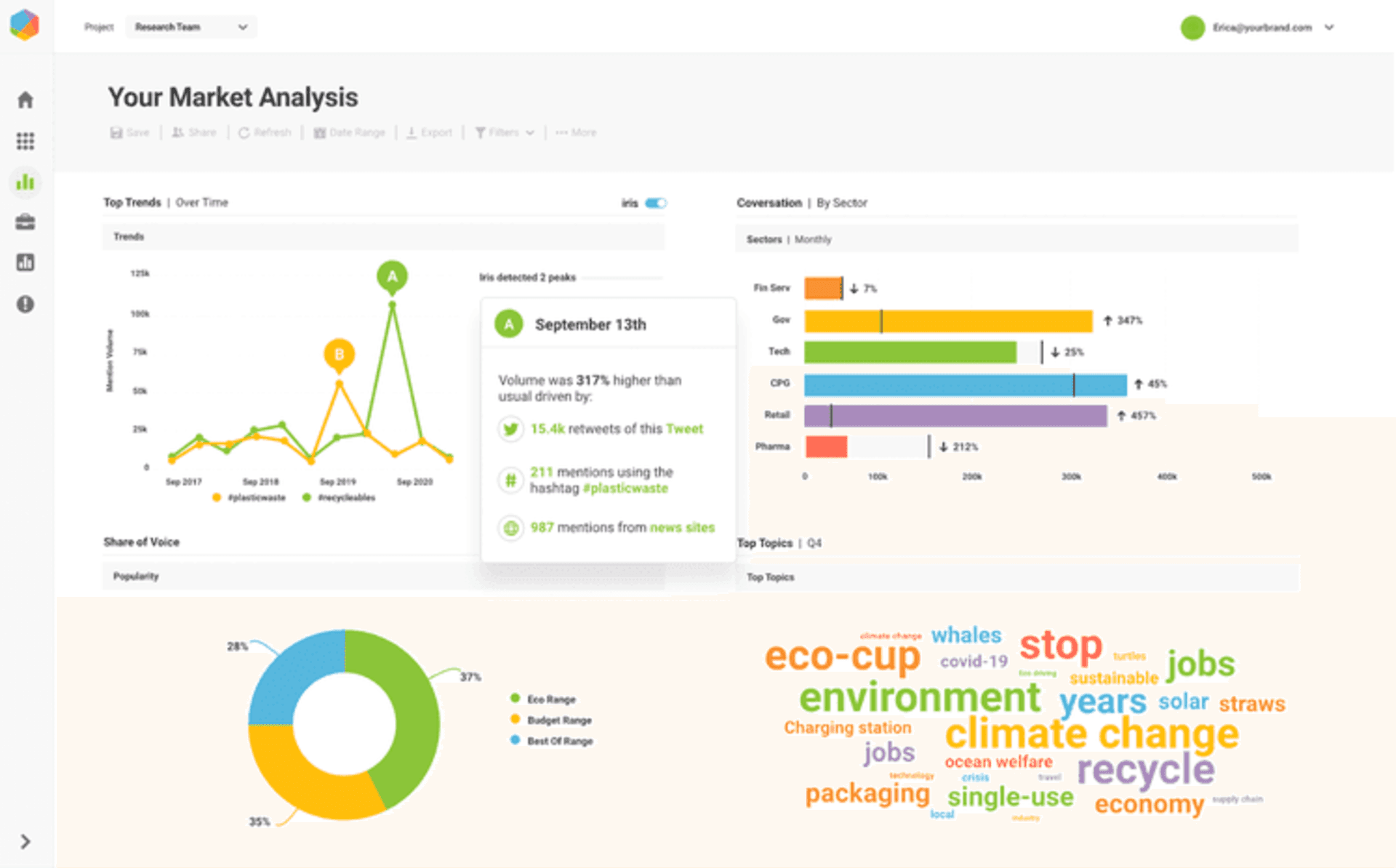
12. Brandwatch
Brandwatch is a social media analytics platform that includes robust sentiment analysis features. It helps brands monitor and analyze consumer sentiment across various platforms, providing insights to drive marketing and customer engagement strategies.
Best For: Brands needing comprehensive social media monitoring and sentiment analysis to guide their marketing efforts.
Notable Features:
Social listening and monitoring tools
AI-powered sentiment detection
Historical data analysis
Custom reporting and dashboards
Pros: Brandwatch provides an extensive suite of tools for social listening and sentiment analysis, helping brands understand how their customers feel about them online. The integration of AI ensures that sentiment detection is accurate and timely, supporting data-driven marketing decisions.
Cons: The complexity and breadth of Brandwatch’s offerings may overwhelm smaller teams or businesses looking for a simpler sentiment analysis solution, potentially requiring more resources for effective use.
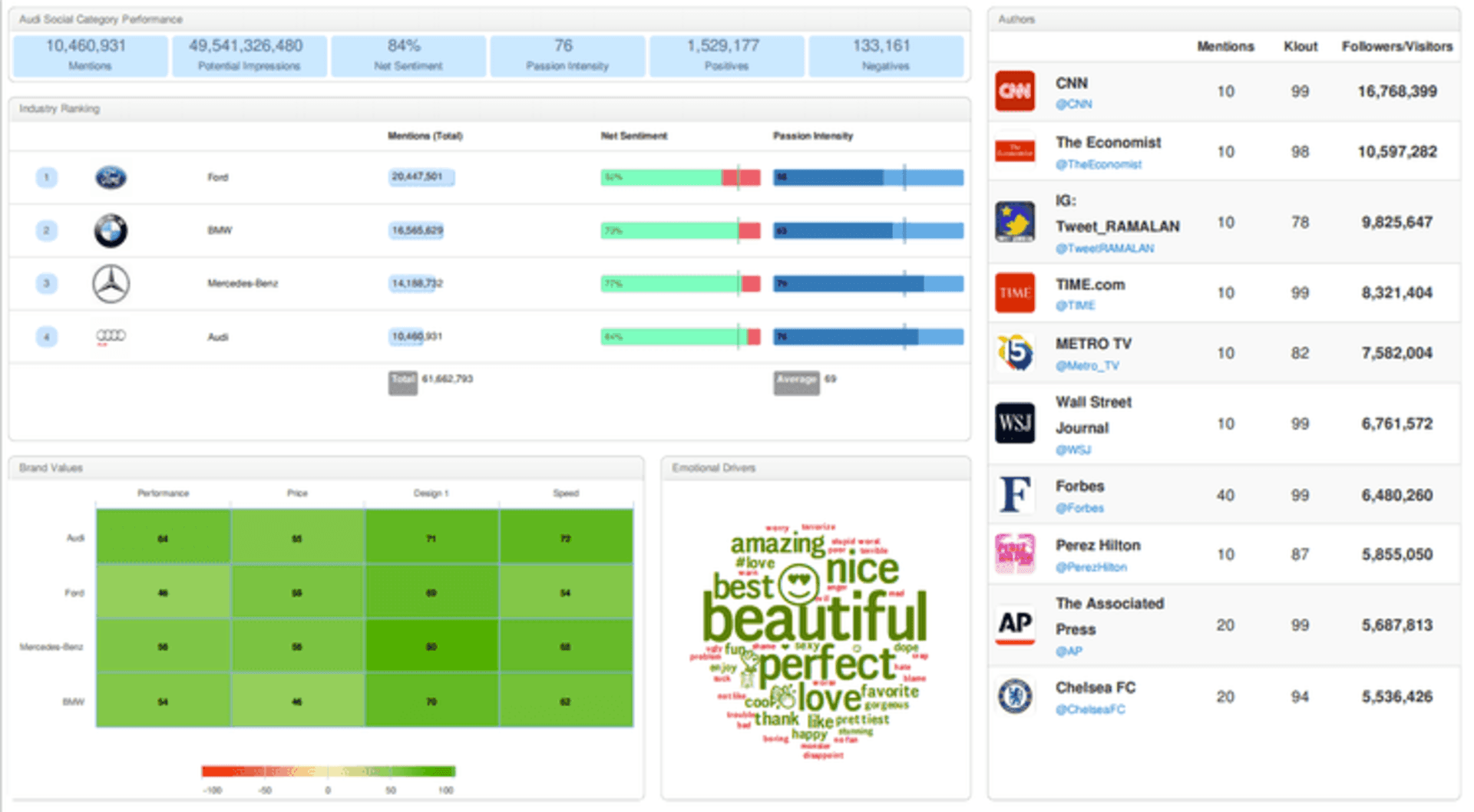
13. NetBase Quid
NetBase Quid provides a powerful platform for social media analytics and sentiment analysis, enabling businesses to gain deep insights into brand perception and consumer behavior across various digital channels.
Best For: Companies looking for a detailed analysis of brand sentiment and consumer insights across social media and online platforms.
Notable Features:
In-depth social media monitoring
AI-driven sentiment analysis
Competitive benchmarking
Customizable reporting options
Pros: NetBase Quid excels at providing rich insights into brand sentiment through comprehensive social media analytics. Its AI-driven capabilities allow businesses to uncover trends and patterns, helping them develop informed strategies to enhance their brand reputation.
Cons: While powerful, NetBase Quid’s extensive features may come with a higher learning curve and cost, potentially making it less suitable for smaller businesses or teams just beginning to explore sentiment analysis.
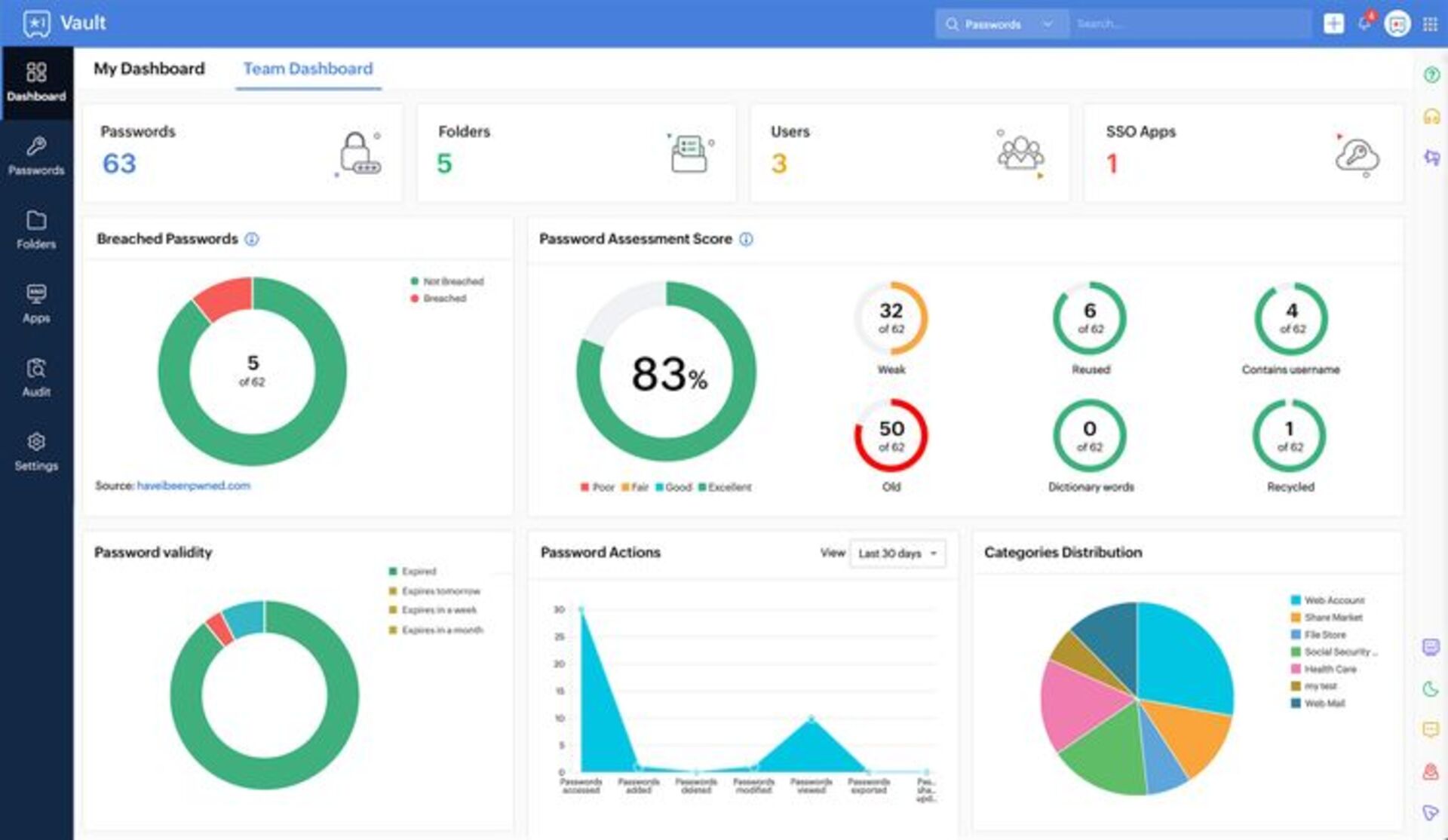
14. Zoho
Zoho CRM offers a comprehensive suite of customer relationship management tools, including sentiment analysis features that help teams assess customer interactions and feedback. Its integration capabilities make it easy to connect sentiment data with broader CRM functions.
Best For: Small to mid-sized businesses looking for an all-in-one CRM solution that includes sentiment analysis to enhance customer relationship management.
Notable Features:
Integrated sentiment analysis with CRM functionalities
Multi-channel customer engagement tracking
AI-driven insights and recommendations
Customizable reporting and dashboards
Pros: Zoho CRM stands out for its user-friendly interface and the convenience of having sentiment analysis integrated directly within a CRM. This integration allows teams to connect customer feedback with specific interactions, providing valuable context for relationship-building efforts.
Cons: While Zoho CRM offers a solid sentiment analysis feature set, its primary focus on CRM functionalities may limit the depth of sentiment analysis compared to dedicated sentiment analysis platforms. This can be a consideration for businesses seeking more extensive analytical capabilities.
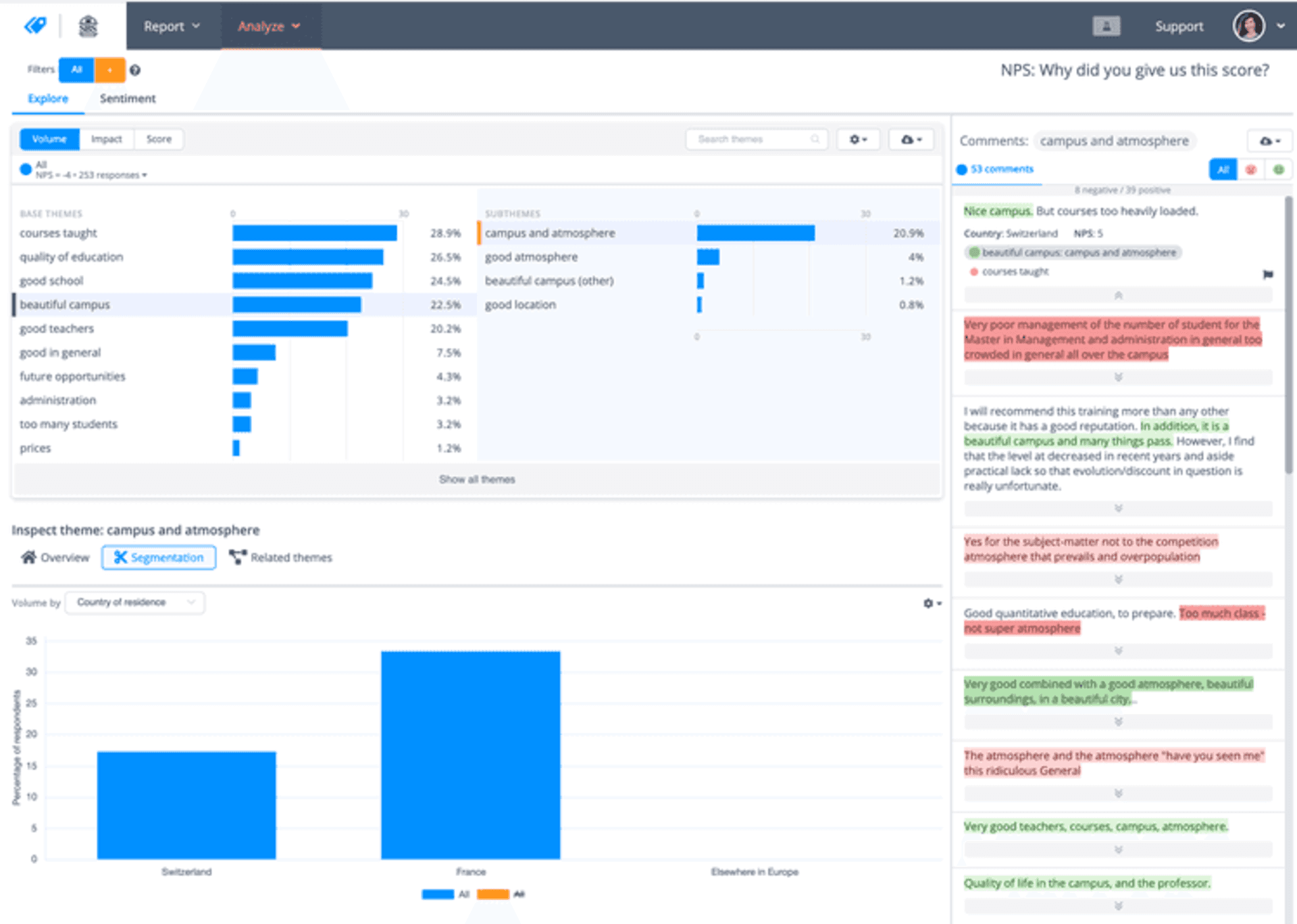
15. Thematic
Thematic is a powerful qualitative analysis tool designed to transform customer feedback into actionable insights. Leveraging advanced natural language processing, it helps businesses categorize and analyze open-ended responses efficiently. Thematic enables teams to discover trends and key themes within customer feedback, making it easier to enhance customer experiences.
Best for: Thematic is especially suited for organizations looking to analyze large volumes of qualitative feedback, such as open-ended survey responses or social media comments. It excels in helping teams uncover underlying customer sentiments and actionable insights that drive strategic decision-making.
Notable features:
Automatic theme identification for open-ended responses
Sentiment analysis to gauge customer emotions
Integration with various data sources, including surveys and social media
User-friendly interface for easy navigation and exploration of insights
Customizable reporting to suit specific business needs
Pros: Thematic's natural language processing capabilities provide in-depth analysis that helps teams discover nuanced customer sentiments. Additionally, the platform features a user-friendly interface, making it easy for team members to access insights quickly without extensive training.
Cons: Some users may find that Thematic offers limited customization options compared to competitors, which could impact flexibility. The pricing of Thematic can be on the higher side, making it a consideration for smaller businesses or teams with limited budgets.
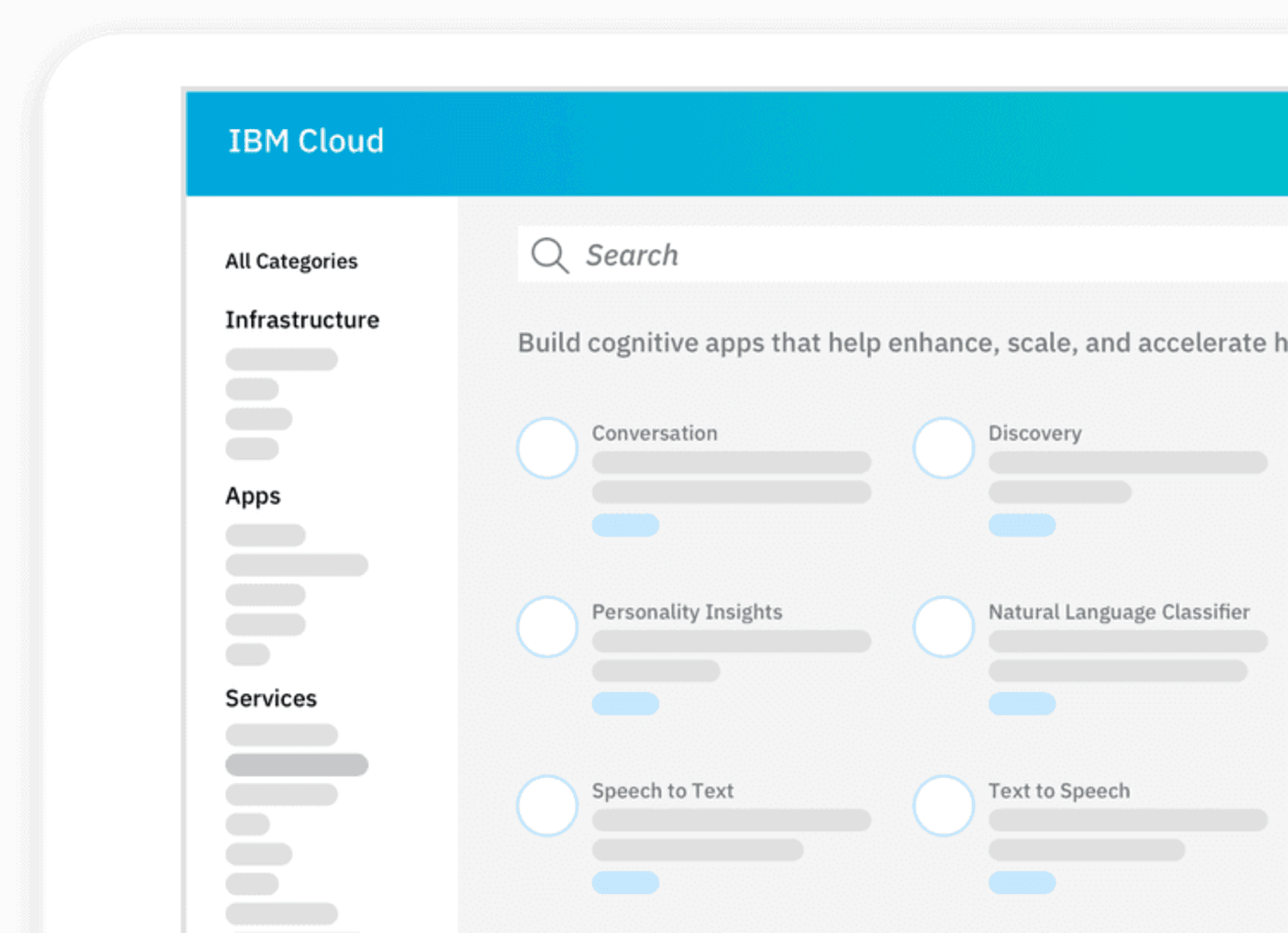
16. IBM Watson Natural Language Understanding
IBM Watson Natural Language Understanding provides comprehensive sentiment analysis along with emotion detection and entity recognition. It leverages machine learning to analyze text data from various sources, offering detailed insights into customer feelings and attitudes.
Best For: Businesses seeking a robust, AI-driven tool to analyze sentiment across diverse data types and formats.
Notable Features:
Emotion analysis alongside sentiment detection
Customizable model training for specific business needs
Integration with IBM Watson services
Detailed reporting and visualizations
Pros: IBM Watson Natural Language Understanding excels in providing nuanced insights by not only measuring sentiment but also detecting emotions, making it valuable for understanding customer attitudes comprehensively. Its customization options allow teams to tailor the analysis to their specific requirements.
Cons: The sophisticated capabilities of Watson may come with a higher price point and require technical expertise for optimal setup, which could be a barrier for smaller organizations.
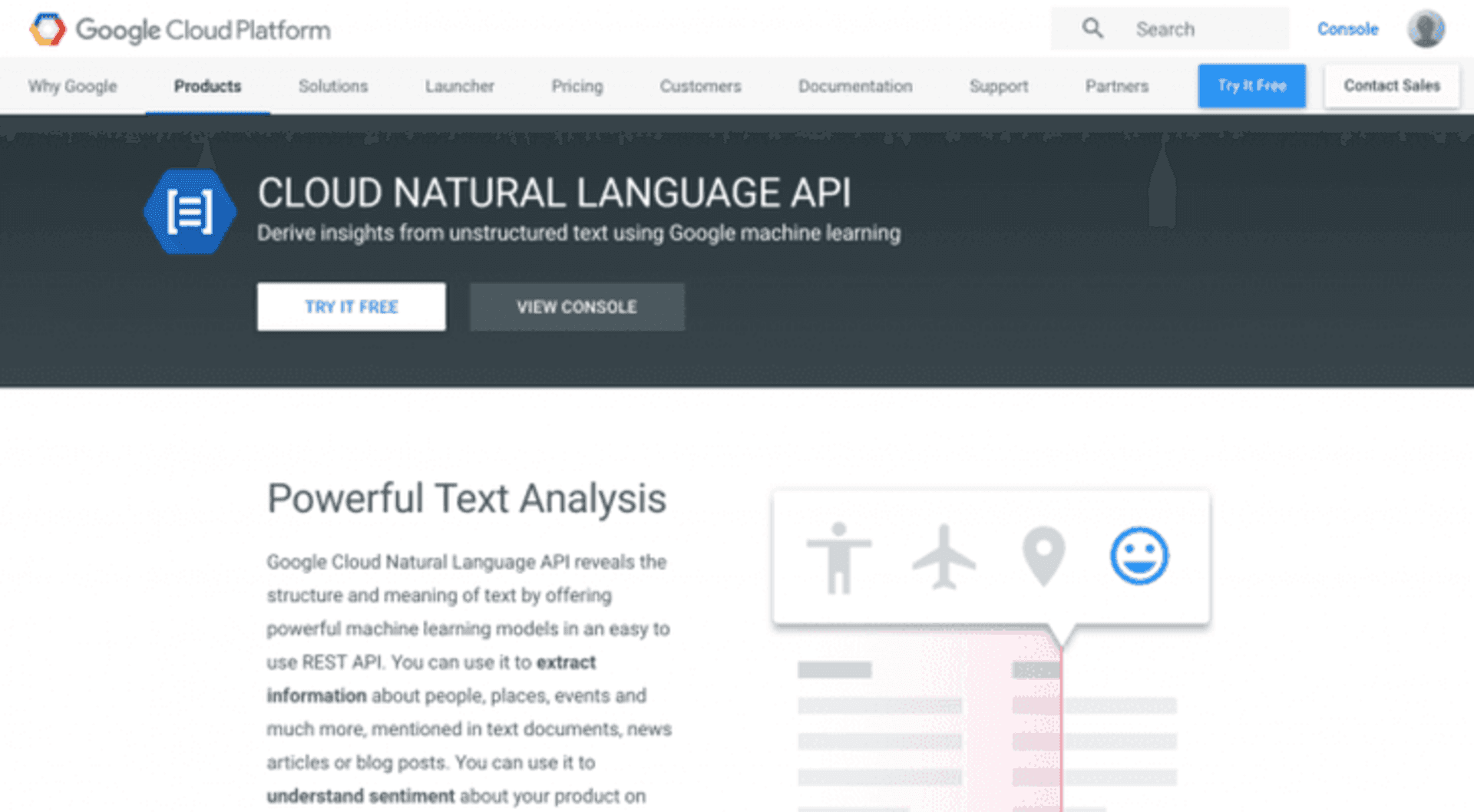
17. Google Cloud Natural Language
Google Cloud Natural Language offers powerful sentiment analysis capabilities as part of its broader suite of AI and machine learning tools. This tool enables businesses to analyze text for sentiment, entity recognition, and syntax, making it versatile for various applications.
Best For: Organizations looking for an AI-powered, scalable solution to analyze customer sentiment across diverse text sources.
Notable Features:
Advanced sentiment analysis with entity recognition
Multi-language support
Integration with other Google Cloud services
Scalable processing for large datasets
Pros: Google Cloud Natural Language stands out for its ability to handle vast amounts of text and deliver insights quickly. The integration with Google Cloud services allows businesses to build customized solutions that fit their unique needs, enhancing data analysis capabilities.
Cons: While it offers powerful features, the complexity of Google Cloud Natural Language might require a steeper learning curve for teams not familiar with Google’s ecosystem or cloud technologies.
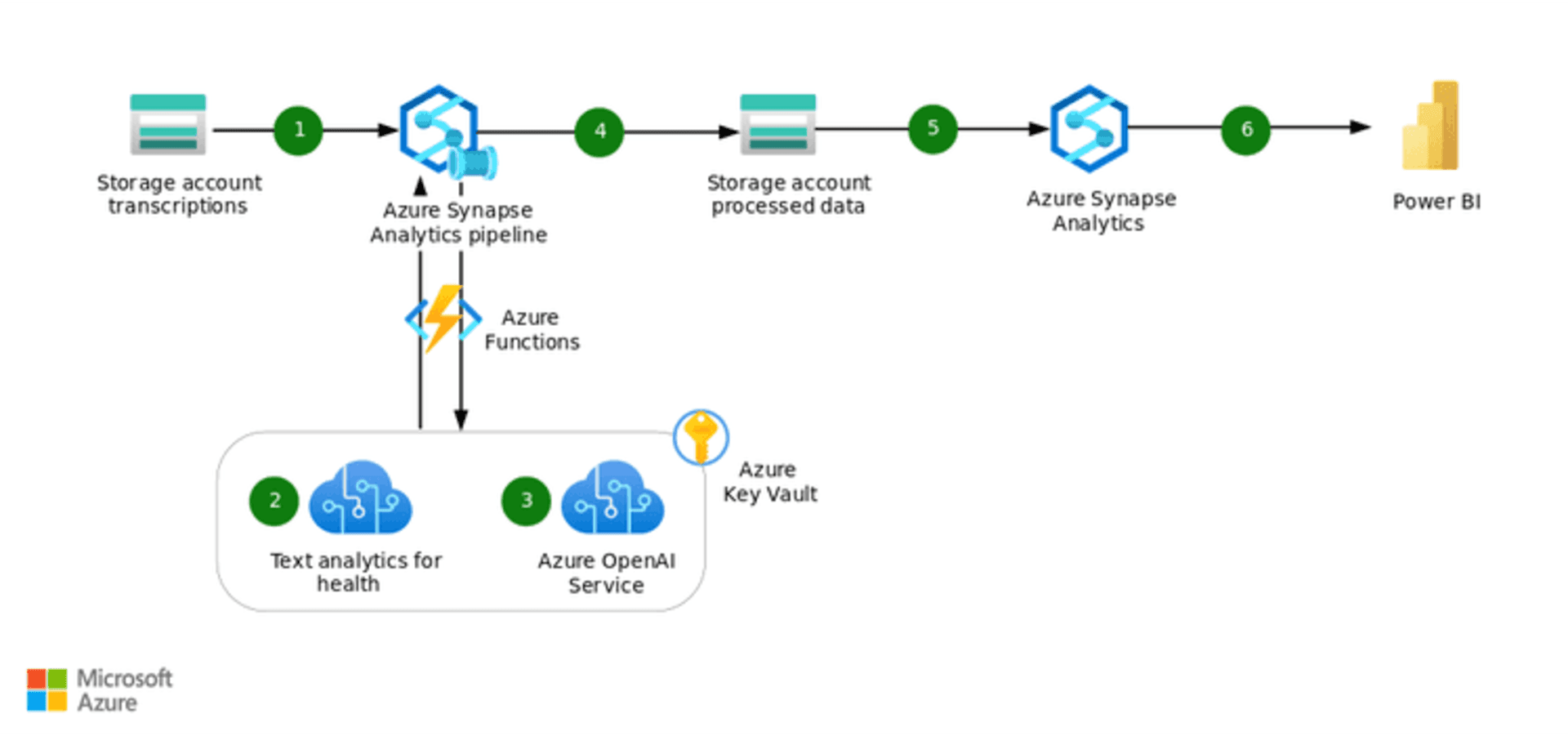
18. Azure Text Analysis
Azure Text Analytics is part of Microsoft’s Cognitive Services suite, offering AI-powered sentiment analysis alongside key phrase extraction, language detection, and entity recognition. Designed for seamless integration with Azure, it provides scalable and real-time text analysis for businesses handling large volumes of data.
Best For: Enterprises leveraging Microsoft’s cloud ecosystem and requiring scalable sentiment analysis with API-based integration.
Notable Features:
AI-driven sentiment analysis with confidence scores
Multi-language support
Integration with Microsoft Azure services
Batch processing for large datasets
Pros: Azure Text Analytics excels in scalability and enterprise-grade security, making it ideal for organizations handling high volumes of customer feedback. Its deep integration with Azure services enables businesses to build comprehensive analytics solutions.
Cons: The API-based nature of the tool may require technical expertise for implementation, making it less accessible for teams without development resources.
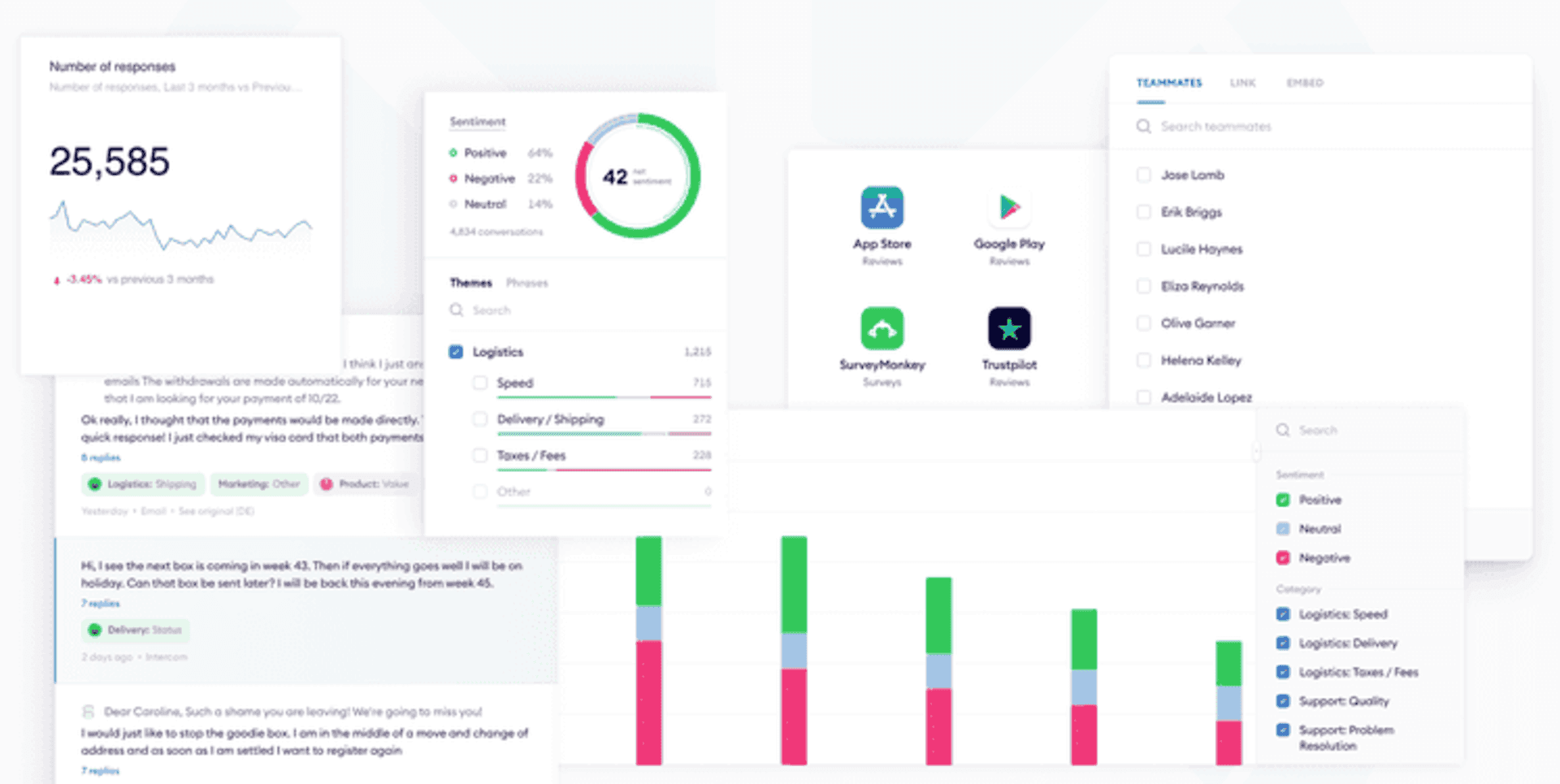
19. Chattermill
Chattermill is a customer feedback analytics platform that combines sentiment analysis with AI-driven thematic analysis. Designed for enterprise teams, it unifies data from surveys, reviews, and support tickets to provide deep insights into customer sentiment and trends.
Best For: Businesses looking for a customer feedback solution that combines sentiment analysis with AI-powered thematic insights.
Notable Features:
AI-driven sentiment and thematic analysis
Multi-channel data aggregation
Customizable dashboards and reporting
Real-time customer sentiment tracking
Pros: Chattermill stands out for its ability to analyze unstructured customer feedback at scale, delivering actionable insights through an intuitive, user-friendly interface. Its multi-channel approach ensures businesses capture sentiment across diverse data sources.
Cons: While powerful, Chattermill’s enterprise focus means it may be overkill for smaller teams or businesses with simpler sentiment analysis needs.
Benefits of Sentiment Analysis

Streamlined Feedback Management
Sentiment analysis tools are invaluable for businesses looking to manage customer feedback more efficiently. These tools aggregate feedback from multiple sources, like social media platforms, surveys, and customer support tickets, providing a unified view of sentiment.
This comprehensive perspective allows businesses to respond to customer feedback more quickly and effectively, significantly improving customer satisfaction and loyalty. By analyzing sentiment, businesses can also identify trends and patterns in customer feedback, which can inform product development and marketing strategies. In short, sentiment analysis tools streamline the feedback management process, making it easier for businesses to stay attuned to their customers’ needs and preferences.








